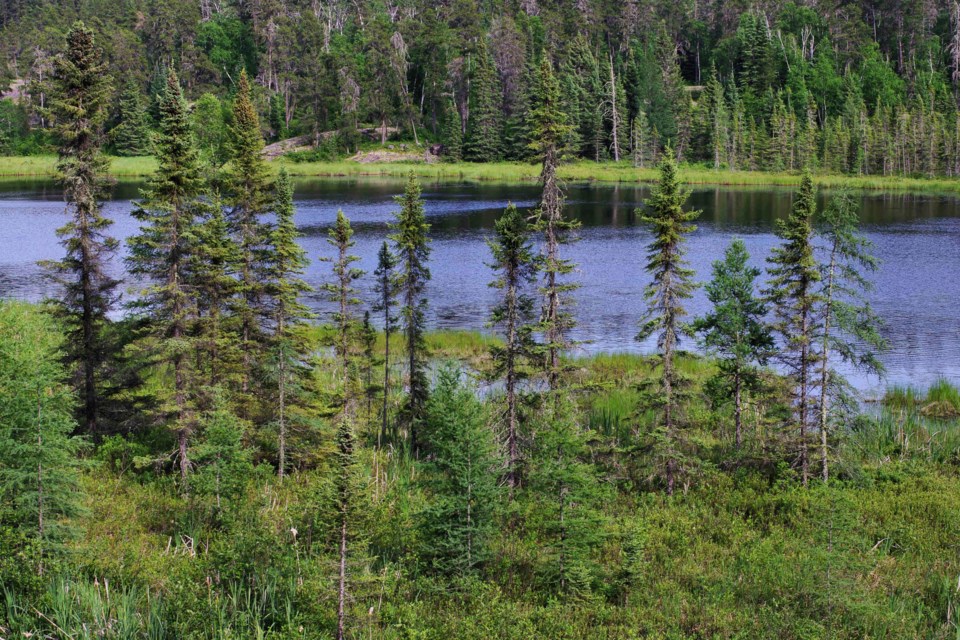THUNDER BAY — The health of Canada's forests is an issue if the county is to meet its climate targets, according to a recent study.
Co-authored by a Thunder Bay researcher, the report, Counting on Canada’s Commitments: To Halt and Reverse Forest Degradation by 2030, Canada Must First Admit It Has a Problem, makes the case that forest heath — not just size — must be prioritized.
The incoming federal government needs to provide leadership in how forests are managed in Canada, particularly around establishing regulations to ensure that overall woodland health is prioritized, says the report.
Thunder Bay’s Julee Boan, partnership director for the Global Nature International Program at the Natural Resources Defense Council, co-authored the report with Rachel Plotkin, the boreal project manager at the David Suzuki Foundation, who is based in Ottawa.
The report was released in April.
“We found by talking to experts and looking at this research that a lot of managed forests across Canada are younger, they're more fragmented, they're less diverse and in some cases less resilient to climate change impacts,” Boan said.
“We thought that was an important story to tell.”
The issue is important now, said Boan as Canada's reporting on its Paris commitments starts next year, with a deadline of 2028.
“With our commitment to the Paris climate agreement, we have to be part of this global stock-take, which is a reporting on how well we've achieved our commitments,” Boan said. “In that, there's also requirements around halting and reversing lands and forest degradation.”
“There's an opportunity right now for the federal government to engage this conversation and determine what are the indicators, how is this going to be monitored, how are they going to report on it, and try to also unite diverse stakeholders, how to respect Indigenous rights, and how to — I would say — regain some trust with the Canadian public.”
Plotkin added that Prime Minister Mark Carney, in response to the trade war with the United States, has talked about accessing broader markets like the European Union — the EU, she said, has a commitment in place to not buy product from degradated forests.
The report focuses on “degradation” of forests (essentially meaning, what the researchers are arguing, is a decline in their health), rather than deforestation, which is removing woodlands in order for the land to be used for other purposes, like urban development or farmland.
The difference is important, Plotkin said, as “it’s like there's a problem that no one is talking about.”
“To date, the Canadian government has neither publicly defined degradation and acknowledged where and to what extent it is occurring domestically, nor recognized it as an issue to be addressed,” the report says.
“I think that deforestation is something that Canada has been hiding behind,” Plotkin said, adding that by focusing on it and the fact that the total forested area in the country hasn’t significantly declined in a long time obscures that the relative health of those forested lands is worsening.
“What we are saying is that the quality of the forests is being degraded and that that is not being talked about, and you can't continue to hide behind the deforestation conversation,” Plotkin said.
The report points to the expansion of industrial activities and infrastructure, including logging roads, as a main reason for the changes, arguing that it’s showing up in the loss of woodland caribou and various species of birds, changes in forest type, and the worsening of the “below ground ecosystem” which the report says includes root systems, fungi and various types of microscopic life.
“There needs to be a systemic change to how … forests are managed in Canada,” Plotkin said.
The report makes several recommendations, including officially defining forest degradation and properly monitoring it, taking a wider look at forestry management planning, instead of, what the report calls the current “sector-by-sector approval process,” changing forest management practices like clearcut logging and herbicide spraying that the researchers say exacerbates climate change, and elevating Indigenous rights and knowledge.

